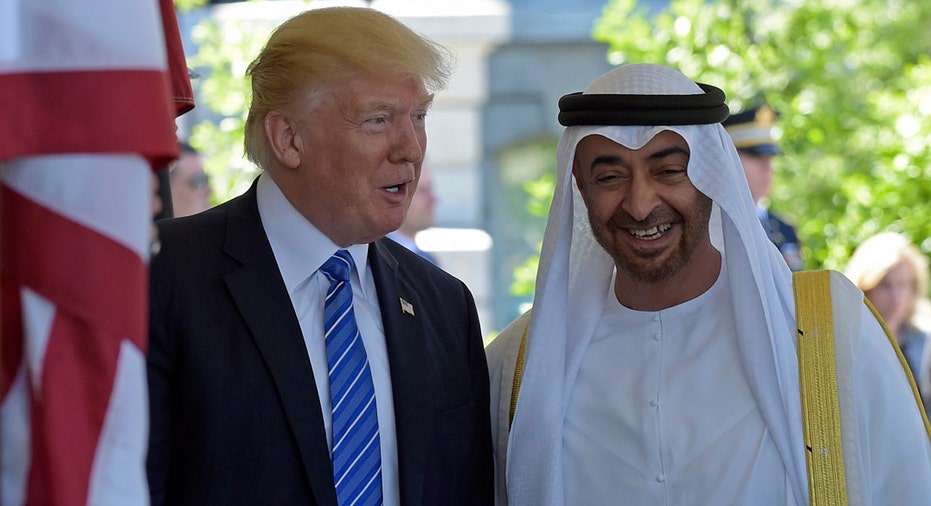Trump - Abu Dhabi Meeting Offers Middle East Reset

President Donald Trump is hosting the Crown Prince of Abu Dhabi Monday ahead of a key meeting with Saudi Arabia that will essentially reset U.S. foreign policy in the Middle East. Relations with the long-time U.S. ally were strained under the Obama administration as the decision to not follow through with the red-line in Syria, and the lifting of the Iranian sanctions, have caused major concerns of stability in the region.
These meetings come at a critical time as the war on terror is heating up and the rise of the U.S. shale oil producer is changing the traditional relationship dynamic we have had with these OPEC members. Historically, it was thought that our relationship with the United Arab Emirates and Saudi Arabia was one based on oil. We would offer them protection in return for a reliable supply of oil. Yet, now with the resurgence of the U.S. oil producer, our relationship is shifting to more of alliance in the war on terror.
Iran is a big threat to the United Arab Emirates and the region. Iran’s dreams of regional domination, along with the rise of ISIS, is making our mutual relationship more critical than ever. Iran is fighting a proxy war in Yemen that the UAE and the Saudis are on the opposite side of. The UAE has been a strong ally in the war on terror and under President Obama the federation felt like it was thrown under the bus.
The Obama administration had the UAE ready for action in Syria before the president changed his mind, even when that red line was crossed. That fateful reversal of fortunes led to more pain for the Syrian people and put countries like the UAE in a much more vulnerable position. It led to the proliferation of more terrorists and emboldened Iran. This was strange because during the Obama years the UAE was viewed as the most important Arab partner because of its military capabilities and opposition to religious extremism.
This reversal on Syria strained U.S. relations and was one of the reasons the UAE helped lead an oil production war that was designed to take out U.S. energy producers including the shale industry. In fact, the UAE made it very clear that U.S. shale was their target and they were out for themselves. They were seemingly suggesting that the U.S. and our foreign policy had hung them out to dry and they were none too happy about it. This was tough talk from a U.S. ally that was usually quiet and left it to the Saudis to do their bidding.
Yet things are changing quickly under the Trump administration; President Trump’s approval ratings might not be tremendously high here in the U.S., but in the UEA, they are soaring. The United Arab Emirates has applauded Trump’s tougher line on its foe Iran and cheered his decision for the U.S. tomahawk strike against Syrian government forces that had crossed more than one red line. The Trump doctrine of taking quick, decisive action against terrorists or foes that cross red lines is much more welcome in a region like the UAE where it seems there are enemies surrounding them.
Ahead of the meeting with President Trump, the U.S. State Department approved the sale of 60 Lockheed Martin (NYSE:LMT) PAC-3 and 100 Raytheon (NYSE:RTN) GEM-T missiles for the UAE Patriot air defense system worth $2 billion. The UAE may be looking for even more purchases in the future.
President Trump’s pro U.S. energy agenda may increase tensions with the UAE at some point because about 40% of the country’s gross domestic product is directly based on oil and gas output, but for now standing up to Iran and ISIS is of more importance to the Emirates. The UAE appears to be on board with the extension of OPEC production cuts. Instead of a relationship of dependence, our relationship is being reset as two strong partners defeating terror in the world. Tension over rising U.S. oil output is for another day as these two allies work together to fight against extremism and terror.
Phil Flynn is senior energy analyst at The PRICE Futures Group and a Fox Business Network contributor. He is one of the world's leading market analysts, providing individual investors, professional traders, and institutions with up-to-the-minute investment and risk management insight into global petroleum, gasoline, and energy markets. His precise and timely forecasts have come to be in great demand by industry and media worldwide and his impressive career goes back almost three decades, gaining attention with his market calls and energetic personality as writer of The Energy Report Opens a New Window..



















